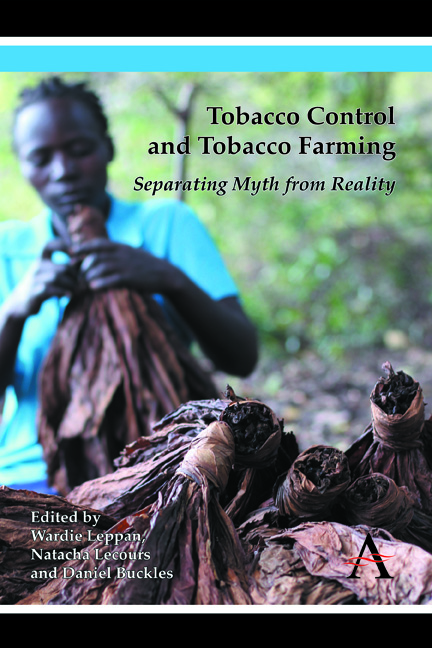Book contents
- Frontmatter
- Contents
- List of Figures, Tables and Photographs
- Foreword
- Preface
- Introduction: Separating Myth from Reality
- Section One The Determinants of Tobacco Leaf Demand
- Section Two Tobacco-Farming Conditions in Low- and Middle-Income Countries
- Section Three Economically Sustainable Alternatives to Tobacco
- Conclusion: Reframing the Debate on Tobacco Control and Tobacco Farming
- Annex: A Policy Brief on Tobacco Control and Tobacco Farming
- Contributors
Annex: A Policy Brief on Tobacco Control and Tobacco Farming
Published online by Cambridge University Press: 05 November 2014
- Frontmatter
- Contents
- List of Figures, Tables and Photographs
- Foreword
- Preface
- Introduction: Separating Myth from Reality
- Section One The Determinants of Tobacco Leaf Demand
- Section Two Tobacco-Farming Conditions in Low- and Middle-Income Countries
- Section Three Economically Sustainable Alternatives to Tobacco
- Conclusion: Reframing the Debate on Tobacco Control and Tobacco Farming
- Annex: A Policy Brief on Tobacco Control and Tobacco Farming
- Contributors
Summary
Context and Importance of the Problem
Despite the unarguable merits of tobacco control, implementation of the Framework Convention on Tobacco Control (FCTC) is only just beginning in many countries. The slow pace of implementation costs countless lives and imposes economic hardship on governments faced with rising healthcare costs and lost opportunities to invest in sustainable development. There is no time or need to delay.
The influence of the tobacco industry lobby on governments and policy makers has been a significant factor behind delays in implementation of the FCTC. Strategies used for decades by the tobacco industry to dilute, delay and defeat tobacco control in high-income countries are now being redeployed successfully in low- and middle-income countries (LMICs) where most of the world's tobacco is now grown and where growth in tobacco consumption is greatest. The thrust of their strategy is to create a fear of tobacco control among policy makers where there should be none. Despite evidence to the contrary, industry representatives claim that:
• Measures to control tobacco use will provoke a livelihood crisis among tobacco farmers and workers in the industry;
• Tobacco farmers are currently relatively prosperous and tobacco farming poses no significant risks that cannot be mitigated;
• There are no economically sustainable alternatives to tobacco farming for smallholder farmers, particularly in low- and middle-income countries.
- Type
- Chapter
- Information
- Tobacco Control and Tobacco FarmingSeparating Myth from Reality, pp. 271 - 276Publisher: Anthem PressPrint publication year: 2014

